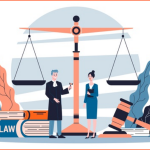On the first day of my law college, a senior professor gave us a lengthy lecture terrorising us about how hard being a litigation lawyer is going to be. Then, she went on to talk about the success stories of our college. She told us how various students whom she mentored ended up working under eminent senior advocates at the Supreme Court right after graduating.
Me and my peers got really hyped up and we couldn’t help but reach out to college seniors or practising advocates to gather some tips and tricks.
Amongst the conflicting advice that we received from them, there was one which stood out.
“Start from the basics. First, get the hang of the practice at District Courts and the High Court and only then you would be able to argue before the Supreme Court.”
Following this advice, I ended up in an internship with a local advocate who handles matters pertaining to District Courts and High Courts. One day, I was assigned the job of simply observing the proceedings of a case in both, the District Court and the High Court.
I got to observe the various styles of arguments and the approach towards dealing with a court case that different counsels follow.
It did not take me much time to realise that the advice which we were given was not going to work.
I realised that the skill-sets required to be used at different courts are quite different and that developing a skill set which works for a lower court does not necessarily contribute to the ability to argue before a higher court.
However, it is only after I started practicing in the Bombay High Court that I came to know that my juniors were actually hesitant to even consider the thought of arguing before the Supreme Court. By this time, I could easily understand the biases or mental blocks that they possessed.
Are you in this zone where you feel terrified at the thought of arguing before the Supreme Court? Let’s consider the reasons why you may be feeling this:
The nomenclature of the Indian courts creates a bias
When you read the words “High court”, what do you think of? If someone were to ask you to explain what is a “High Court”, how would you answer?
One might say that a High Court is a court which is higher than the District Courts. Similarly, if you read the words “Supreme Court”, the response which would naturally ensue is that it is the highest, or the most superior court.
This simplistic understanding which the nomenclature of the courts creates in our minds makes us think that we must follow this hierarchy of courts if we want to become a successful litigator. Moreover, there are instances where some lawyers do not have adequate understanding of practice, procedure and etiquette followed in the Supreme Court.
Sanchita Ain, an Advocate on Record at Supreme Court of India, who is keen on guiding lawyers about practising before the Supreme Court says:
“The hierarchy (in Courts) is in the sense that there is a court which is the last resort. But that does not mean that you need something extra to practise there. You need a different skill set and there isn’t a hierarchy in these skill sets.”
Once you realise this, you can easily get rid of this artificial distinction in your mind. And hence, get over the self-doubt.
Do you become a better lawyer if you start from the trial court?
Some may be of the opinion that you need to have a certain kind of foundation that only a trial court can give you.
The Supreme Court is not concerned with examining the intricacies of a case or a matter.
Unlike the High Courts or the District Courts, the Supreme Court seldom considers the questions of facts. It is primarily concerned with the questions in law.
This makes the working of the Supreme Court vastly different from that of the trial courts.
In a trial court, you deal with matters pertaining to procedures almost everyday. While the Supreme Court considers mainly the substantive issues of law and it is only in exceptional circumstances that it will consider issues of facts in a case. The strategic advantages that an advocate practising in lower courts has in terms of the procedural law would already be applied at the lower courts before the case reaches the Supreme Court.
If you look at the career trajectories of some of the sitting and former Supreme Court justices (here and here), you would realise that none of them have started their practice from the trial courts.
In addition, certain matters like matters related to the Constitution are only dealt with by the Supreme Court.
If Constitution Law is the niche that you are looking to develop, you would not be able to gain anything which can contribute to it from your experience at the lower courts.
Now, you will tell me that you do understand that the work and skill sets are different and therefore, a hierarchy of courts is not required to be followed. But how about establishing a practice as a young lawyer? Is there enough work available?
The volume and ambit of work before the Supreme Court has increased
To some extent, in the earlier days, young lawyers working under Supreme Court advocates were not paid as much and hence, people experienced financial constraints in establishing their own practice at Supreme Court level. The number of matters reaching the Supreme Court were not as many as it is today. People would accept the judgement of the High Court and maybe think that if they didn’t make it through the District Court and the High Court levels, there were hardly any chances of them winning at the Supreme Court level and so it wasn’t even worth trying.
However, in today’s times, people aren’t hesitant to exhaust all remedies available.
Today, not only has the volume of cases in the Supreme Court increased but often it may also happen that the same matter goes through various rounds at the Supreme Court itself. Because of this the ambit of work which a young lawyer can do in Supreme Court has multiplied and various roles are now open for young lawyers.
However, it takes time and effort to build your practice at any Court
Whether or not you choose to start at the lower courts, it is of utmost importance to begin practising as early as possible.
Building credibility and reputation is imperative in the legal profession since it directly links with the nature of cases that you would get.
As rightly said by Rennard Strickland and Frank T. Read in their book The Lawyer Myth: A Defense of the American Legal Profession,
“Lawyers are the foot soldiers of our Constitution.”
Therefore, every young counsel should be willing to improvise with belief in oneself and no one should become complacent about their prowess in the field of law.
Hence, it’s not like you would need to shell out a higher degree of time and efforts to build your practice at the Supreme Court because you didn’t have the experience of working at the trial courts – you would need to put in a good amount of time and efforts anyway. Don’t shy away from putting these in.
How to start if you want to build a practice at the Supreme Court as a young lawyer?
Don’t the clients for Supreme Court matters only approach the experienced lawyers? Why would anybody engage a young lawyer as an arguing counsel for Supreme Court matters?
Is it possible for you to get the X factor that an arguing counsel requires in order to get matters before the Supreme Court without having the grey hair?
Well, without thinking about how many years you would require, the first thing for you to do is to start practising.
You would need to build a reputation
Although practising at a High Court would be completely different as compared to the Supreme Court, you might take it up with a focus on clients who are likely to bring on Supreme Court matters to you.
You are therefore looking at the practice not from the perspective of gaining the skill sets, but from the perspective of gaining a network of relevant clients and building credibility.
In addition to this, set out with a gusto to build your profile. The best way to gain more visibility in the industry as a young counsel would be to take up pro-bono work, author books or research papers pertaining to your niche and representing organisations which have a significant public interest. In order to build your personal brand as a young professional in the legal industry you would have to pursue projects and activities which constantly keeps you in the public eye. Try to host or participate in webinars with reputed organisations on topics which are relevant to your chosen niche.
Lawyers like Gopal Sankaranarayanan, Menaka Guruswamy and Gautam Bhatia built their practice in the Supreme Court in a relatively short amount of time, using such methods.
Wouldn’t you like to be one of such people? Wouldn’t you like to break the glass ceiling and be discussed as an inspiration for other young counsels in our country?
In order to attain such a status, the sooner you start at the Supreme Court, the better it is for you to build a practice at the Supreme Court in the long term. Supreme Court justices are lenient and accommodative of young counsels appearing before them.
Junior counsels are encouraged by the Supreme Court to argue. They want to break the complacency of the Seniors and the mental block which more and more young counsels are having due to being intimidated by the thought of appearing before the Supreme Court.
Whenever you choose to start practising, it would take a while to get used to it, to get better at it.
Build an understanding of what exactly it takes
Another point of action in order to end up building a strong foundation for your practice in the Supreme Court would be to prefer Judicial Clerkship right from the moment you graduate from law school.
Lawyers and judges in the Supreme Court are not used to having lawyers around who do not know what is to be done. This sets the expectations high. Having said that, everyone has a first time.
Through a judicial clerkship, you are bound to learn in-depth from your Seniors regarding the practical application of laws and strategies in order to obtain a favourable judgment from a Supreme Court justice. Moreover, you will not only understand how to effectively draft petitions, but you would also be equipped with the ability to distinguish a good draft from a shoddy draft. You will learn about how the court registries function and how the cases before the Supreme Court are filed.
Having said that, the greatest advantage of pursuing a judicial clerkship is that it enables you to gain the initial recognition from Supreme court justices which you can further leverage to establish your own credibility.
Develop the requisite skill sets
If you wish to learn more and bridge the gap in your skill sets as a young counsel and the the skill sets which are required for an successful career at Supreme Court, take a look at our recently curated Certificate Course in Advanced Supreme Court Practice: drafting, procedure and strategy and don’t forget to get your hands on the free study material!
In this course we will skill you in honing your research, drafting, and arguing skills particularly for Supreme Court practice as a young counsel. Moreover, we will also train you in the strategic moves required to tackle practical challenges and how to grow your practice and profile aggressively. No more feeling like an outsider at the Supreme Court! We have designed this course which gives you an opportunity to develop your own niche with the help of meticulously designed exercises so that you can find your space in this arena.
In a few hours, we will be conducting a workshop on How to set up a Supreme Court Practice for newcomers, which can help you with a step by step plan on how to build such practice.
You can register for it by clicking the links provided below:
https://lawsikho.com/setupsupremcourtpractice
The workshop is entirely free. See you there!
If you want to be notified about other workshops and webinars conducted by LawSikho on Supreme Court Practice, please join the Telegram or WhatsApp group below:
Telegram Group: https://t.me/joinchat/VlcPkD6lTNt7G8iK
WhatsApp Group: https://chat.whatsapp.com/Iy1xm7AdQBL0juq24Pn1vO
All the best for all your endeavors! Keep shining.
Students of Lawsikho courses regularly produce writing assignments and work on practical exercises as a part of their coursework and develop themselves in real-life practical skills.
LawSikho has created a telegram group for exchanging legal knowledge, referrals, and various opportunities. You can click on this link and join:
https://t.me/lawyerscommunity2
Follow us on Instagram and subscribe to our YouTube channel for more amazing legal content.






 Allow notifications
Allow notifications
